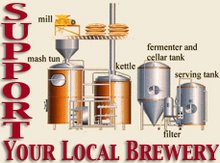Hopping on the hop bandwagon
 Hops are growing in Ocean County. Even at this very moment.
Hops are growing in Ocean County. Even at this very moment.
In fact that’s them to the left, getting a good start after their early-April planting. Probably in another week, since hops grow rapidly, it may be time to get a trellis going and start coaching the bines to climb it.
This set is the more robust of four plantings we did of Centennial, a bittering hop that takes quite well to most growing areas, including the flowerbed on the side of our house. It’s good for American pale ales and American renditions of IPA (like Stone IPA), and is similar to Cascade, Chinook and Columbus.
With hop growing on our minds and the worldwide hop shortage – and the subsequent price spike – we surmised that New Jersey would be fertile ground for commercially growing hops.
After all, New Jersey falls within a hop-friendly latitude and still lays some claim to the title “Garden State.” Never mind that subdivision coming soon to fallow land near you. (For the record, we are told that hops were once widely grown in New York state, around the early 1900s, but apparently not in New Jersey.)
So we put the hop-prospects question to the agriculture folks at Rutgers University. What we got was an answer that was part recent history and part economics, something that was not entirely yes or no.
First, hops, as a farm commodity, do look attractive right now, as any crop does when it’s fetching top dollar in the marketplace. And if you recall, hop prices have shot up lately (so has the price of your beer), thanks to some recent bad harvests and lost acreage. Meanwhile, the popular-of-late extreme beer category has further boosted demand for hops. That super-duper, triple-double IPA ultra hop bomb you told your buddy is the best beer you ever poured probably used more hops to make than all the homebrewed beers in New Jersey combined.
And if you recall, hop prices have shot up lately (so has the price of your beer), thanks to some recent bad harvests and lost acreage. Meanwhile, the popular-of-late extreme beer category has further boosted demand for hops. That super-duper, triple-double IPA ultra hop bomb you told your buddy is the best beer you ever poured probably used more hops to make than all the homebrewed beers in New Jersey combined.
But hyperbole aside, higher demand plus tighter supply equals sharply higher prices, something that puts smiles on farmers’ faces. So, yeah, hops are kind of lucrative at the moment. And New Jersey still has farmers, and RU did some hop growing demonstrations in the mid- to late-1990s at a research farm in Hunterdon County, planting Willamette, Nugget, Cascade, Perle and Chinook varieties.
RU sent some of their hops to a Pacific Northwest lab for testing to determine the alpha acid/bittering strengths, critical information any brewer needs.
What RU learned was that the bittering potential of the Jersey hops generally fell within the preferred range of hops from Washington State’s Yakima Valley, where over three-fourths of U.S. hops are grown. (Some of the high alpha hops, like Chinook and Nugget were slightly below their Yakima cousins, but not much. Chinook, by the way, used to be the bitttering hop in Flying Fish’s brews but has since been replaced.) Also, the Jersey hops didn't fall victim to pests that couldn't be handled.
RU’s efforts came just after New Jersey finally entered the craft brewing era. The Ship Inn brewpub, the British ales specialists in Milford in Hunterdon County and a front-runner in the Jersey pub brewing movement, served beer it made with the Garden State hops at dinner for folks involved in the project and a local legislator, Assemblywoman Connie Myers.
(FYI: Myers sponsored legislation that would have provided incentives for producing hops, so long as they were used by microbreweries in New Jersey. The bill never cleared committee, another reason to frown about craft beer's status in this state. Myers, by the way, gave up her Assembly seat in 2005.)
To underscore that growing hops around here isn’t a far-flung idea, RU folks mentioned that Weyerbacher Brewing in Easton, Pa., just across the Delaware River from Phillipsburg, planted an acre of hops a couple of weeks ago. Dan Weirback, the man behind such Weyerbacher brews as Double Simcoe IPA, Blithering Idiot (barley wine) and Black Hole (porter-stout) wasn’t immediately available to elaborate on the scope of their efforts. (We still hope to find out from him.)
So given RU's past work and current market conditions, things look favorable for Jersey fresh hops, right?
Sort of. But here’s where things become the bitter truth, so to speak.
While easy to grow, RU folks say, hops are expensive to harvest. Unlike some kinds of produce, they’re a crop you can’t efficiently harvest by hand. As RU’s John Grande, a fellow with PhD in horticulture tells us, it would be like trying to harvest corn one kernel at a time.
The vines are easy to cut down, but getting all the lupulin-packed cones is another matter, and for that farmers would need to mechanize. But the equipment needed for that job is pricey enough to cut deeply into profit potential, if not sour the deal outright.
Sigh.
But, remember RU’s answer wasn’t an outright "no," either.
There’s always the farmer’s old standby, the co-op, like-minded agriculturalists pooling resources so the overhead gets spread around and the price of that expensive harvesting and drying equipment (hops are generally dried somewhat before they’re used in brewing) isn’t coming out of one pocket. So there's some hope, if you're championing the idea of New Jersey becoming a player in the hop field.
But realistically, what’s the wind-up for Jersey hops? It’s like any new business venture: develop a sound game plan front to back and hope you’re in the right market at the right time.
Who knows, though, maybe Weyerbacher is smart to hop on hops. Maybe now is the right time.














2 comments:
beerfest video?
OUTSTANDING BLOG! And good luck with your hops; they should grow well in Jersey. I'm orginally from Philly, but I live in Arkansas now.
If you are not already a member, I'd like to invite you to join our group of over 2,000 hop growers where we discuss all related issues such as trellises, fertilization, irrigation, pest and disease control, hop storage, etc. We also have Wiki, free rhizomes, a whole-hops exchange, and more. My 'Grow-Hops' portal -- http://home.alltel.net/billvelek/growhops.html -- explains the different features in our 'Yahoo' and '.com' groups.
Cheers.
Bill Velek
Post a Comment